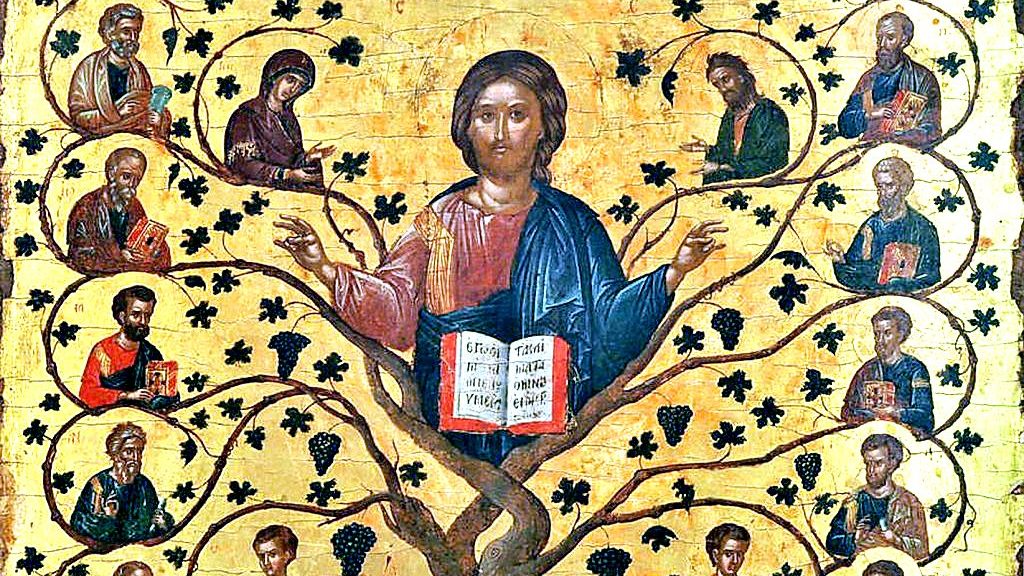Who Belongs to the Church?
5th Sunday of Easter (Year B)
“I am the vine, you are the branches. Whoever remains in me and I in him will bear much fruit, because without me you can do nothing.”
John 15:5
Who is a member of the Church? Taken in a purely legalistic sense, the answer is fairly straightforward: all those who are baptized.
But there is more nuance to it. For example, those preparing for baptism can be said to already belong to the Church by virtue of their being accepted into the catechumenate. And those who are baptized outside of the Catholic Church are said to be in “imperfect union” with the Church, meaning that they are still Christians even though they lack unity with the universal (catholic) Church.
But not everyone who is baptized is a disciple of Jesus Christ, nor is every Catholic necessarily a good Catholic. Often when we engage in debate over who is or isn’t a faithful Catholic, we are making judgments about other people. And unless we happen to be a bishop deciding whether or not we ought to excommunicate someone, that’s not generally an edifying exercise.
The truth is that none of us are as good or sincere a disciple of Jesus as we ought to be, so it’s a much better use of our time to look inward and ask, am I living and acting as a genuine disciple of Jesus Christ? Or are there areas of my own life that need amendment? This Sunday’s readings give us a few things to consider in terms of what authentic discipleship looks like.
Proclaiming the Gospel
In the first reading from Acts 9:26-31, people are concerned that St. Paul may not be a true disciple. That’s understandable. It wasn’t that long before that he was actively persecuting Christians, so we can’t blame people for being wary.
Our reading mentions two things that convinced them. One was the testimony of Barnabas, a trusted leader in the community. Another is when Paul “spoke out boldly in the name of the Lord” (Acts 9:27).
Looking at our own lives, are we bold in our proclamation of the gospel? Or do we shy away from speaking the truth about Jesus to others because we fear how they might react?
Keeping the Commandments
In the second reading (1 Jn 3:18-24), St. John says the way “we shall know that we belong to the truth” is that we “believe in the name of Jesus” and “keep his commandments.” These two things go together. Believing in Jesus means obeying Jesus. Otherwise we’re just giving him lip-service, and that’s not belief.
So we should ask ourselves, how faithful am I in following the commandments, including the commandment of Christ to “love one another?” Do I love others with the same love that Christ loves me, laying down his life for me on the cross? Am I willing to make sacrifices for others, even when I don’t like them? Even when they persecute me?
That might seem impossible — and in human terms, it is. The secret to doing it is found in the gospel reading for this Sunday.
Remain in Me
In our gospel reading (Jn 15:1-8), Jesus describes himself as the vine and we, his disciples, as the branches. “Just as a branch cannot bear fruit on its own unless it remains on the vine,” we can do nothing apart from Jesus. But Jesus promises that “whoever remains in me and I in him will bear much fruit.”
What does it mean to “remain in Jesus?” How do we stay attached to the vine? On one level, this means having faith in Christ as our divine Redeemer and Savior. It means relying on Christ to guide, admonish, and comfort us in prayer.
But on a very practical level, it means participating in the sacraments. Uniting us to Christ, and keeping us united to Christ, is precisely what they are for! It’s why Christ instituted them and entrusted them to the Church. The sacraments “graft” us onto the life-giving vine of Jesus. Through baptism, confirmation, and the Eucharist we unite our lives with his, and through confession we heal and restore that union when our sins threaten to cut us off from the vine. To “remain in” Jesus in the sacraments is to have Jesus’ own life flowing through us, which is the only thing that makes it possible for us to love as he loves.
So we should ask, how faithful am I to the sacramental life of the Church and to prayer? Do I receive the sacraments regularly? Do I attend Mass every Sunday? When was the last time I went to confession? How connected am I to the vine?
No matter where we are in our relationship with Jesus, if we examine ourselves honestly in light of this Sunday’s readings, we will no doubt discover that we have room to grow. Christian discipleship means always learning, always growing, conforming our hearts and minds more fully with the Divine Will as his grace slowly, over time, bears the fruit of sanctity.
Elsewhere in the gospels Jesus describes the Church as a vineyard, and in one place he speaks of the wheat and the weeds growing together. This tells us that the Church in this world is still growing. The fruit is not yet ripe. We are all imperfect Christians in this life, works in progress, until the final harvest when everyone will either be a saint or a dead branch cut off from the vine.

